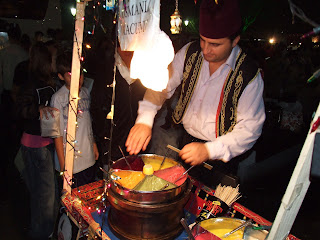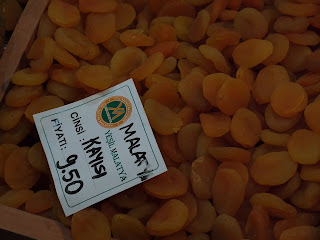You know what Bulgaria looks like even before you see it.
Just close your eyes and think about the houses, the animals, the landscape.
And you are exactly right.
The hills are a patchwork of ragged crops littered with trash and circled by horse-drawn buggies. The cars are antique and painted in dust. Houses are collapsed red-tiled roofs with laundry flying off the clothesline. In the cities, people live in row upon row of Communist block apartments, stacked together by plaster like bathroom tiles. Every one of the apartments is occupied.
We arrived early Friday morning in Plovdiv and spent the next few hours wandering around town exploring the sites. Dig down a few feet anywhere in Plovdiv and you're bound to find something. History oozes from every corner of this town…with ruins dating back 7000 years to 5000 BC, the area has been continually inhabited, invaded, destroyed, rebuilt, re-invaded and so on since that time. Walking around Plovdiv you can see Roman Ruins, Thracian Ruins (from 5000 BC), Churches from the 13th Century through to the 17th Century and Mosques from the Turkish occupation.
After a quick lunch at a traditional Bulgarian restaurant we caught our bus to Sofya and settled in for the next 2 hours to watch the countryside fly by. When we stepped out of the bus station and flagged a cab to get us to our hostel, it finally hit me that we were definitely not in Istanbul anymore. The taxi drivers waited patiently in their cars until you picked one out, hopped in, and gave them a destination unlike in Turkey where no matter where you go you are bound to have no less than 10 drivers shouting buyrun, buyrun (in true Welcome Back, Kotter, ‘ooh, ooh, pick me, pick me!!’ fashion - 5 points to whoever can name the character reference). Much to my delight, the cab driver was talkative and we chatted in Russian all the way to the hostel about how I liked Bulgaria, where I was from, and how I liked studying in Istanbul. As we drove through town, he pointed out good places to eat and how to get to various sites that we just had to visit while we were there.
After checking in, we set out for the evening to explore Bulgaria’s capital city. Sofya is much like any Eastern European big city and can be summed up in very few words: small, dirty, and looks like Communism fell last year, not almost 2 decades ago. Despite the desolate atmosphere of the place, only made gloomier by the grey skies, cold temperatures (35 F) and rain, the city is dotted with stunning churches, monuments, and architecture. Our wanderings around town were cut short as the rain quickly turned to snow and we came upon a park. Here, we played in the snow for almost an hour as the remaining daylight disappeared and darkness set in.

Saturday morning was spent exploring the rest of the city that we skipped the night before. When we arrived at Saint Sofya, the Bulgarian Orthodox Church in the city’s center known for being partly blow up in a terrorist attack in 1925 and later rebuilt, we wandered in only to find a wedding about the take place. We weren’t the only tourists there though, and after trying to slip out quietly before being noticed in the back a kind little old lady started pulling us towards seats. Attempting to explain that we were sorry and would just leave didn’t work so well seeing as she didn’t speak any English, only Bulgarian and limited Russian. Instead we were told to take a seat, enjoy the wedding, and get to see what a Bulgarian Orthodox service was like…why not? Although I was skeptical, the 20 minutes service was beautiful and Orthodox customs quite interesting. None of us understood a word of what was said, seeing as the entire service was chanted and sung in Old Bulgarian, but it was fascinating to watch none-the-less. From there, we wandered around town to see some monuments before ending up at the Aleksander Nevski Cathedral – an absolutely stunning golden domed building with the interior completely covered in gorgeous paintings, goldwork, thousands of candles, and almost 100 Orthodox icons.
Saturday afternoon we went up to Vitosha National Park, the mountain only a few kilometers from Sofia. The taxi ride there was crazy, with the driver making up lanes, muttering in Bulgarian and hitting the ceiling of the taxi at random times. We rode the smaller lift half-way up the mountain, the other lift, apparently, ne rabotayet (wasn't working) though. With the ground mushy, slippery, and still covered in snow, we didn’t make it all the way to the top like we had planned, but still had fun and enjoyed the view and the snowball fights.

My favorite memory of Bulgaria was the trip we made to Rila Monastery in the mountains of Bulgaria Sunday and Monday morning. The monastery was started by St. Ivan Rilski, a hermit who lived in a cave for 12 years, and today it is on the UNESCO World Heritage List. We spent Sunday morning and early afternoon doing some hiking in the Rila Mountains before finally taking the path down that would lead us to the monastery itself. The monastery is a place of inspiration for everyone: it is a place where you can escape from the hectic life of modern society, and get yourself back on track again by experiencing the beauty, mystique and simplicity of this place…enough time for contemplation about the meaning of life, since there is not much else to do then. We stayed Sunday night at the monastery (which to this day is still practicing) and once again I had some really neat conversations with a few of the monks over supper.


I woke early Monday morning around 6 am and sat outside in the cloisters until around 730 just to think and enjoy the silence. It was so quiet during this period, occasionally from behind a door a rustle of keys could be heard, a monk would walk out, walk a few meters bring out some keys and enter a new door. Then a few minutes later another door and another (or possibly the same) monk would repeat the process. This weekend trip, although a spur of the moment decision, was a chance for us to escape the daily hustle and bustle of Istanbul and big city life. This hour and a half of me-time was serene and the crisp mountain air and quiet, still surroundings was just what I needed.
We took a bus around 9:30 that morning and made the 2 hour trip back to Sofya to catch our bus to get back to Istanbul and real life. This trip, unlike the one we made Thursday night was completely in daylight so we got to see much more of the Bulgarian and Turkish countryside as we traveled the 9 hours to get back home to rejoin the hustle and bustle of Istanbul.























